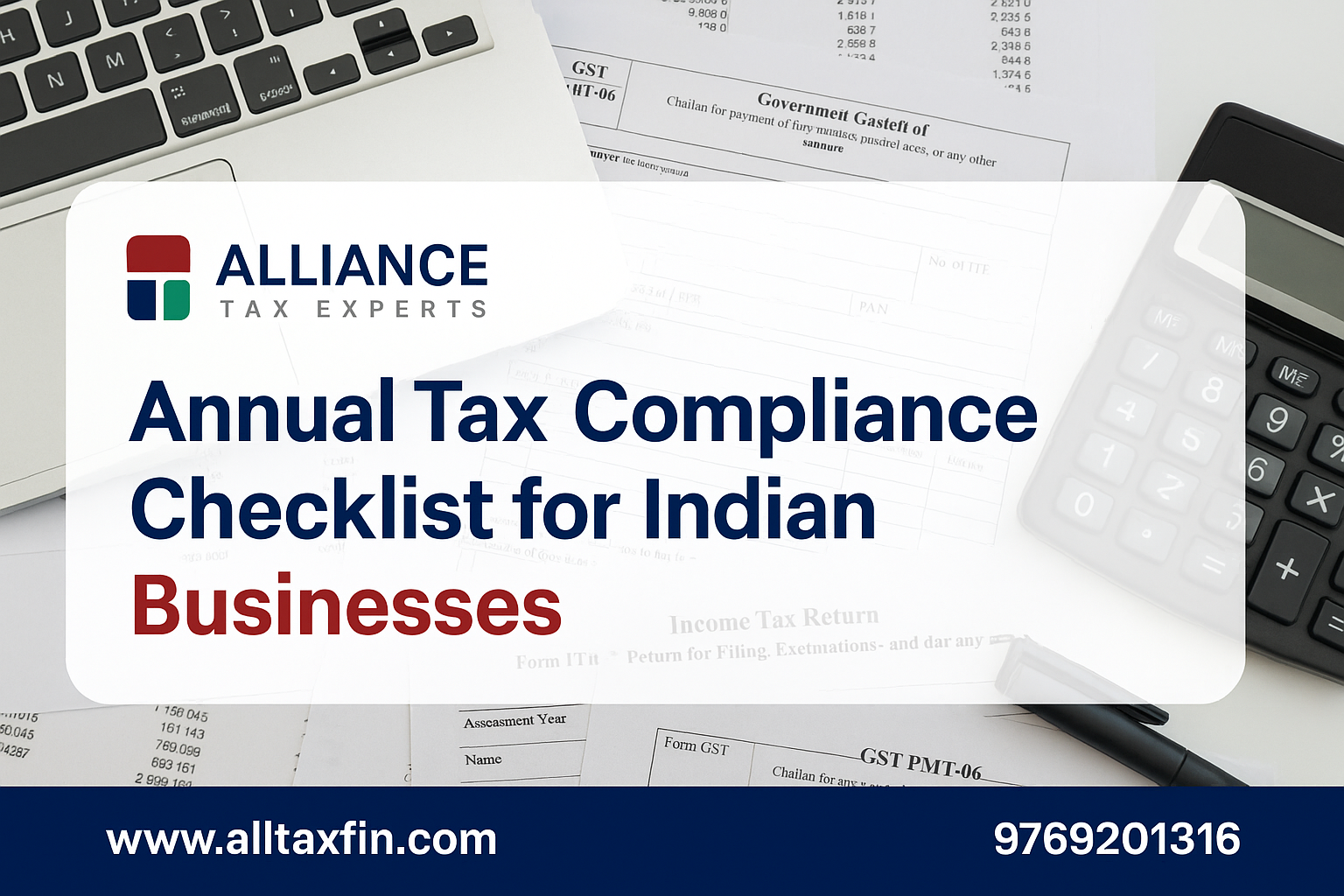
08 May
Annual Tax Compliance Checklist for Indian Businesses
Annual Tax Compliance
Checklist for Indian Businesses: Avoid Penalties and Run Smooth Operations
Staying compliant with tax laws is not just a legal
requirement—it's also essential for building a trustworthy and financially
sound business. In India, the Income Tax Department, GST authorities, and other
regulators keep a close watch on businesses that miss deadlines or underreport
taxes. To help you stay on track, here’s a practical guide to the annual tax
compliance steps every Indian business should follow:
1. Maintain Proper Books
of Accounts
Under the Income Tax Act and GST laws, maintaining accurate
records of your income, expenses, assets, and liabilities is mandatory. Whether
you're a small trader or a Pvt Ltd company, make sure your accounts are
well-organized and up to date. Use accounting software or consult a tax experts
for regular bookkeeping.
2. Know Your Tax
Obligations
Identify all taxes applicable to your business:
- Income
Tax: Based on your profit.
- GST:
On the sale of goods and services.
- TDS:
If you make payments that attract tax deduction at source.
- Professional
Tax, PTEC, and PTRC: Mandatory for businesses and professionals in
many states.
3. File Returns on Time
Missing return deadlines can lead to heavy penalties and
even scrutiny:
- Income
Tax Return (ITR): Usually by 31st July (non-audit cases) or 31st
October (audit cases).
- GST
Returns: Monthly (GSTR-1 & GSTR-3B) or quarterly under QRMP
scheme.
- TDS
Returns: Quarterly filing of Form 24Q, 26Q, etc.
- Annual
Compliance: For companies (MCA filings), tax audit (Form 3CA/3CB &
3CD), and others.
4. Pay Advance Tax or
Self-Assessment Tax
If your income tax liability exceeds ₹10,000 in a financial
year, you are required to pay advance tax in quarterly instalments. This
avoids interest under sections 234B & 234C.
5. Issue TDS Certificates
and Form 16/Form 16A
Ensure timely issuance of:
- Form
16: For salaried employees (by 15th June).
- Form
16A: For TDS on non-salary payments.
- Delay
in this can lead to compliance issues and affect employee relations.
6. Conduct Year-End Review
of Accounts
Before closing your books:
- Reconcile
GST with books and GSTR-2B.
- Verify
TDS deducted vs deposited.
- Check
depreciation schedules, loan statements, and provisions for any pending
expenses or liabilities.
7. Consult a Chartered
Accountant
A tax experts can help you:
- Identify
missed deductions.
- Avoid
errors in filings.
- Ensure
timely compliance with MCA, IT, and GST requirements.
8. Stay Updated on Tax Law
Changes
Indian tax laws change frequently. New Budget updates,
notifications, or amendments may impact your tax liability. Subscribing to a
trusted consultant or tax expert’s newsletter can help you stay aware.
9. Preserve Supporting
Documents
Keep:
- Invoices,
bills, GST returns, ITRs, and audit reports for at least 6–8 years.
- Backup
copies of digital documents.
This helps in smooth audits and scrutiny proceedings, if any.
10. Review Your Business
Structure
Evaluate if your current structure (Sole Proprietor,
Partnership, LLP, Pvt Ltd) still suits your operations and tax goals.
Sometimes, changing the structure can help save taxes or offer better legal
protection.
Final Word:
Compliance is not a burden—it's a discipline that safeguards your business,
builds credibility, and opens the door to funding, government tenders, and
long-term growth.
Need help with tax filings or annual compliance?
Contact Alliance Tax Experts at 9769201316 or visit www.alltaxfin.com for expert
guidance.
#TaxComplianceIndia #IncomeTaxFiling #GSTFilingIndia #BusinessCompliance #AvoidTaxPenalties #AllianceTaxExperts #ITR2025 #TaxPlanningTips #CAccountantIndia #MSMEIndia #TaxConsultantNaviMumbai #FinanceTipsForBusinesses #SMECompliance #AnnualFilingIndia #TaxAuditReady #StayCompliantStaySafe